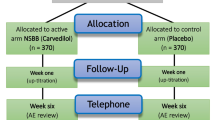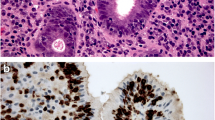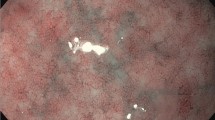Abstract
Rabeprazole, a new proton pump inhibitor, wasstudied in patients with acid-pepticrelated diseases(duodenal ulcer, gastric ulcer, GERD) in threeplacebo-controlled, double-blind, randomized clinicaltrials. Men and women over the age of 18 were enrolledif the presence of an active duodenal or gastric ulceror erosive or ulcerative esophagitis was confirmed onupper gastrointestinal endoscopy. Patients were randomly allocated to either placebo orrabeprazole 20 mg or 40 mg in the duodenal and gastriculcer protocols or to placebo or rabeprazole 10 mg, 20mg, or 40 mg in the GERD protocol. All doses ofrabeprazole in all three studies were statisticallysignificantly superior to placebo in healingacid-related lesions. There were no treatmentdifferences between the rabeprazole doses in healingactive peptic lesions. The incidence of positive [13C]ureabreath test for H. pylori was 53% in patients withduodenal or gastric ulcers. H. pylori status was noteffected by treatment with rabeprazole.
Similar content being viewed by others
References
Physicians Desk Reference, Medical Economics Company, Inc., Montvale, New Jersey, 1996
Havu N: Enterochromaffin-like cell carcinoids of gastric mucosa in rats after life-long inhibition of gastric secretion. Digestion 35(suppl 1):42-55, 1986
McTavish D, Buckley MM, Heel RC: Omeprazole. An updated review of its pharmacology and therapeutic use in acid-related disorders. Drugs 42:138-170, 1991
Morii M, Takata H, Fujisaki H, Takeguchi N: The potency of substituted benzimidazoles such as E3810, omeprazole, Ro 18-5364 to inhibit gastric H+,K+-ATP~S~ is correlated with the rate of acid-activation of the inhibitor. Biochem Pharmacol 39:661-667, 1990
Fujisaki H, Shibata H, Oketani K, Murakami M, Fujimoto M, Wakabayashi T, Yamatsu I, Takeguchi N: Effects of the proton pump inhibitor, E3810, on gastric secretion and gastric and duodenal ulcers or erosions in rats. Drug Invest 3:328-332, 1991
Hirai M, Azuma T, Ito S, Kato T, Kohli Y: A proton pump inhibitor, E3810, has antibacterial activity through binding to Helicobacter pylori. J Gastroenterol 30:461-464, 1995
Tsuchiya M, Imamura L, Park JB, Kobashi K: Helicobacter pylori urease inhibition by rabeprazole, a proton pump inhibitor. Biol Pharm Bull 18:1053-1056, 1995
Eisai, Inc: Data on file. Eisai, Teaneck, New Jersey.
Hetzel DJ, Dent J, Reed WD, Narielvala FM, Mackinnon M, McCarthy JH, Mitchell B, Beveridge BR, Laurence BH, Gibson GG: Healing and relapse of severe peptic esophagitis after treatment with omeprazole. Gastroenterology 95:903-912, 1988
Klein PD, Graham DY: Minimum analysis requirements for the detection of Helicobacter pylori infection by the 13c-urea breath test. Am J Gastroenterol 88: 1865-1869, 1993
Asaka M, Kato M, Kudo M, Meguro T, Kimura T, Miyazaki T, Inoue K: The role of Helicobacter pylori in peptic ulcer disease. Gastroenterol Jpn 28(suppl 5): 163-167, 1993
Bardhan KD, Dekkers CP, Lam SK, Nowak A, Schaffalitzky de Muckadell OB, Schutze K,Tildesley G, Kler L, Forster JK, Lacey LF, et al: GR122311X (ranitidine bismuth citrate), a new drug for the treatment of duodenal ulcer. Aliment Pharmacol Ther 9:497-506, 1995
Beglinger C: Current perspectives in ulcer disease. Ther Umsch 47:681-685, 1990
Bell GD, Powell KU: Eradication of Helicobacter pylori and its effect in peptic ulcer disease. Scand J Gastroenterol Suppl 196:7-11, 1993
Berstad K, Berstad A: Helicobacter pylori infection in peptic ulcer disease. Scand J Gastroenterol 28:561-567, 1993
Fedotin MS: Helicobacter pylori and peptic ulcer disease. Reexamining the therapeutic approach. Postgrad Med 94:38-40, 43-45, 1993
Gad A, Hradsky M, Furugard K, Malmodin B: Campylobacter pylori and gastroduodenal ulcer disease. A prospective study in a Swedish population. Scand J Gastroenterol Suppl 167:8185, 1989
O'Connor HJ: The role of Helicobacter pylori in peptic ulcer disease. Scand J Gastroenterol Suppl 201:ll-15, 1994
Rune S: Helicobacter pylori , peptic ulcer disease and inhibition of gastric acid secretion. Digestion 51 (suppl 1):ll-16, 1992
Vaira D, Miglioli M, Mule P, Holton J, Menegatti M, Vergura M, Biasco G, Conte R, Logan RP, Barbara L: Prevalence of peptic ulcer in Helicobacter pylori-positive blood donors. Gut 35:309-312, 1994
Good DJ, Dill S, Mossi S, Frey R, Beglinger C, Stalder GA, Meyer Wyss B: Sensitivitat und Spezifitat eines vereinfachten, standardisierten 13c-urea-~temtests zum Nachweis von Helicobacter pylori. Schweiz Med Wochenschr 121:764-766, 1991
Klein PD, Graham DY: Minimum analysis requirements for the detection of Helicobacter pylori infection by the 13C-urea breath test. Am J Gastroenterol 88: 1865-1869, 1993
Savarino V, Mela GS, Zentlin P, Cutela P, Mele M, Vigneri S, Celle G: Variability in individual response to various doses of omeprazole. Implications for antiulcer therapy. Dig Dis Sci 39:161-168, 1994
Leiete LP, Johnson BT, Just RJ, Castell DO: Persistent acid secretion during omeprazole therapy: A study of gastric acid profiles in patients demonstrating failure of omeprazole therapy. Am J Gastroenterol 91:1527-1531, 1996
Cloud ML, Olovich K, Enas N, Bassion S, Humphries T: LY307640 versus placebo in healing erosive, ulcerative reflux esophagitis. Gastroenterology 108:A73, 1995
Humphries TJ, Cloud ML, Enas N, Bassion S, McNamara M, Mele M, Vigneri S, Celle G, The U.S. Raberprazole Gastric Ulcer Study Group: Rabeprazole (E3810, LY307640) achieves high rates of healing in active gastric ulcer. Gastroenterology 110:A138, 1996
Cloud ML, Olovich K, Enas N, Bassion S, Humphries T: LY307640 versus placebo in healing duodenal ulcers. Gastroenterology 108:A73, 1995
Rights and permissions
About this article
Cite this article
Cloud, M.L., Enas, N., Humphries, T.J. et al. Rabeprazole in Treatment of Acid Peptic Diseases (Results of Three Placebo-Controlled Dose-Response Clinical Trials in Duodenal Ulcer, Gastric Ulcer, and Gastroesophageal Reflux Disease (GERD)). Dig Dis Sci 43, 993–1000 (1998). https://doi.org/10.1023/A:1018822532736
Issue Date:
DOI: https://doi.org/10.1023/A:1018822532736




